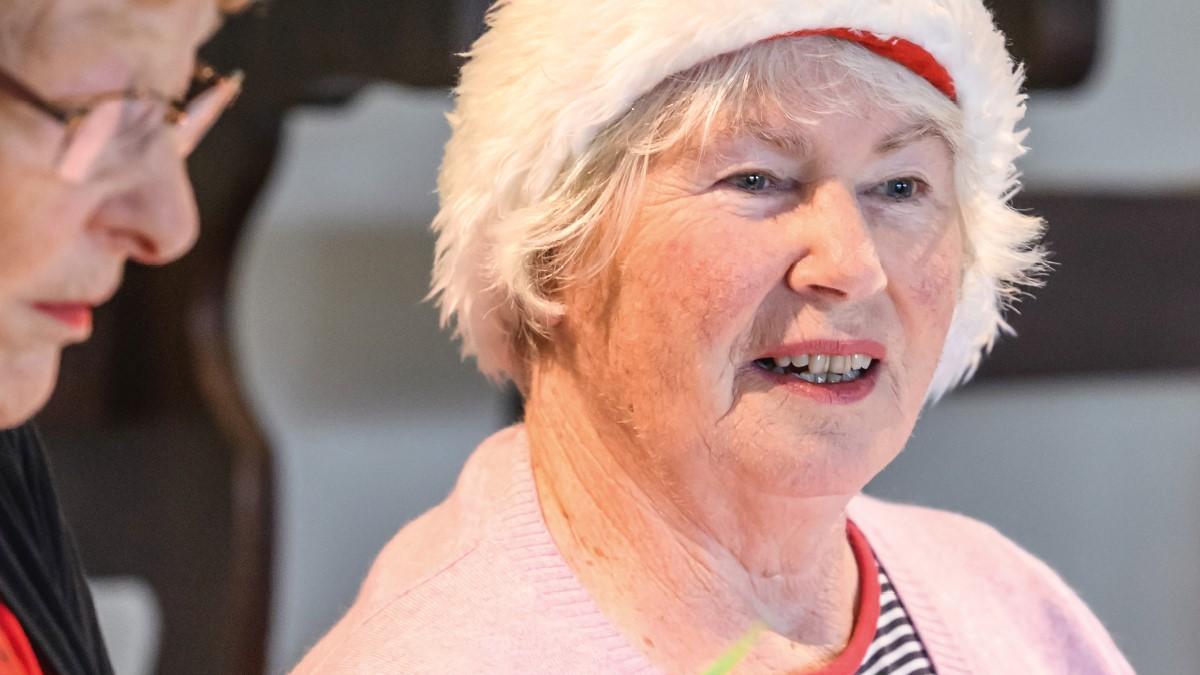The benefits of singing in a COPD community choir

Choirs come into their own at Christmas and their popularity has been on the rise in recent years, not least because of the therapeutic effects for people with chronic obstructive pulmonary disease (COPD). While singing in a choir has obvious social benefits, its popularity is supported by a number of research studies that provide some evidence of its benefits as an intervention both for participants and audience.
Worcester’s Sing4Breath COPD choir was formed in 2014. Initially it consisted of people with COPD who had attended the local pulmonary rehabilitation programme. Four years on, the choir is now self-funding and open to anyone with a respiratory problem. A talented and exciting choir leader is employed to direct the sessions. Participants do not need to be able to sing in tune to join, although members report being surprised at the lovely sound they make collectively. This Christmas season the choir started playing to appreciative audiences at the end of November with festive hats and carols at a nursing home in Droitwich.
Choir member Patricia Whiting says: ‘I thought choirs were only for people who could sing. Having had breathing problems for many years, I was almost afraid to even try to sing so never did, apart from at school or at home privately. When I joined Sing4Breath two years ago I was surprised that I could actually sing in tune.’
Choir participants report noticing improvements in breathlessness, their ability to manage breathlessness, the quality of their breathing and their general health. They attribute these benefits both to the singing itself and the breathing exercises beforehand led by the choirmaster, a trained voice coach.
Memory boost
Another possible benefit is that the known cognitive decline in COPD may be slowed through the process of learning and memorising new songs.
‘I can actually hold the notes longer than I could two years ago,’ Patricia says. ‘And if I have to take a quick breath, I do – and I don’t worry about it.
‘Our choir leader teaches us ways of elongating our breath to our individual maximum by “measuring” and “controlling” our out breath by gradually stretching out our arm, thus releasing our breath slowly and as far – individually – as we possibly can.
‘We also learn about where our breath is stored and use our stomach muscles. We then continue with slow songs using the techniques we have learned in the warming-up session.
‘In some ways it also helps with memory as we are learning new songs all the time.’
Participants describe a ‘social solidarity’ experienced by attending Sing4Breath. They report the comfortable environment created by the knowledge that everyone has a respiratory condition, so they are able to identify with the associated symptoms and limitations. Yet despite the common health problems, the focus of the group is on achieving something that isn’t health-related.
Patricia says: ‘We know that we aren’t being judged, that we can sit or stand or have a drink or cough without being quizzed – without anyone taking notice or commenting. When we join the choir we may not know anyone at all, but we all have one thing in common: we have a lung condition. We all know what it feels like to “run out of breath” and we support each other without being condescending.’
Sheila Spragg, another choir member, adds: ‘It helps to be in a social, friendly group of people who all have the same type of health problem. Very rarely do they mention their illness as they are too busy socialising with the other choir members.’ The choir has also developed friendships and reduced social isolation.
Choir members attend consistently throughout the winter months when there is a higher risk of becoming isolated. Participants report it is a highlight in their week and something to look forward to.
‘We finish off our session with tea or coffee and cakes, so what’s not to like?’ says choir member Kate Broadbent.
Wellbeing
Participants also describe increased happiness as a result of attending Sing4Breath. Members find the singing is an aid to relaxation and say they have experienced improvement in their feelings of depression.
‘Sing4Breath Choir gives us the confidence to be who we are,’ says Patricia. ‘We laugh and we sing, the endorphins kick in and when we leave at the end of the session we are all happier than when we arrived.
‘Mentally, the Sing4Breath choir is a happy place to be.’
Kate adds: ‘Some weeks I am not always feeling at my best, but the minute I arrive all that is forgotten.’ And Sheila says: ‘We spend as much time laughing, as some of our members are real comedians, which helps with the feelgood factor.’ Even though a number of choir members have severe COPD, in the last two years there have been no admissions to hospital. Participants also report that exacerbations appear to have resolved more quickly since they joined the choir.
While there is a need for empirical evidence of improved measurable outcomes to underpin interventions such as this, it is also refreshing to consider informal participant feedback. As choir member Kate says: ‘Joining the Sing4Breath Choir has been one of the best things that I have ever done.’
- Dr Elaine Bevan-Smith is an advanced nurse practitioner in COPD and pulmonary rehab, and senior lecturer at the University of Gloucestershire
Number of subscribers: 2




































